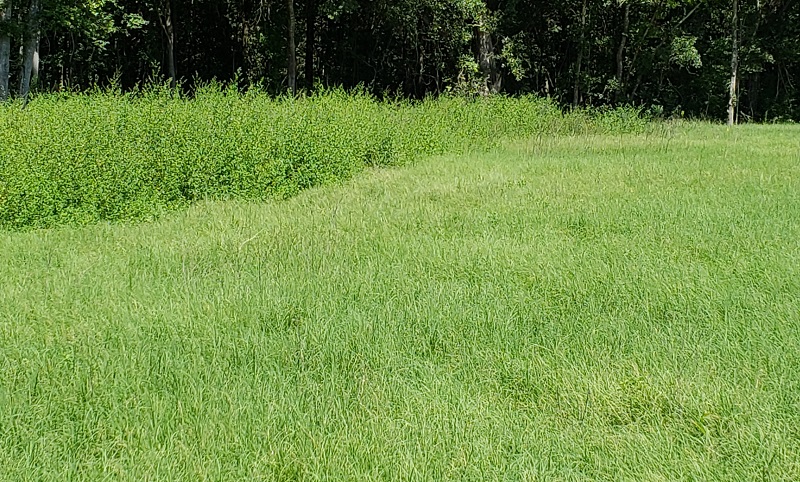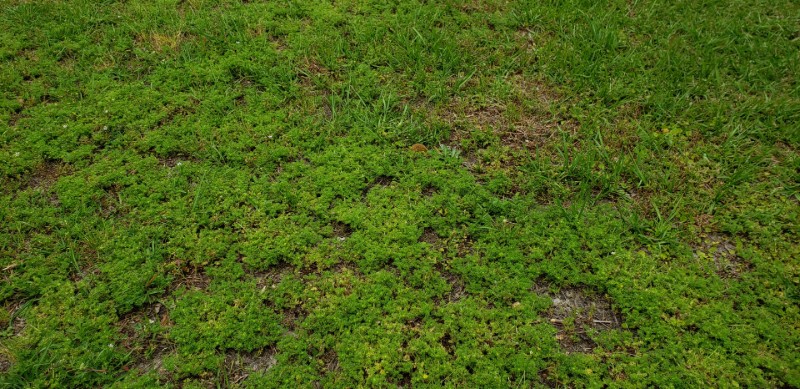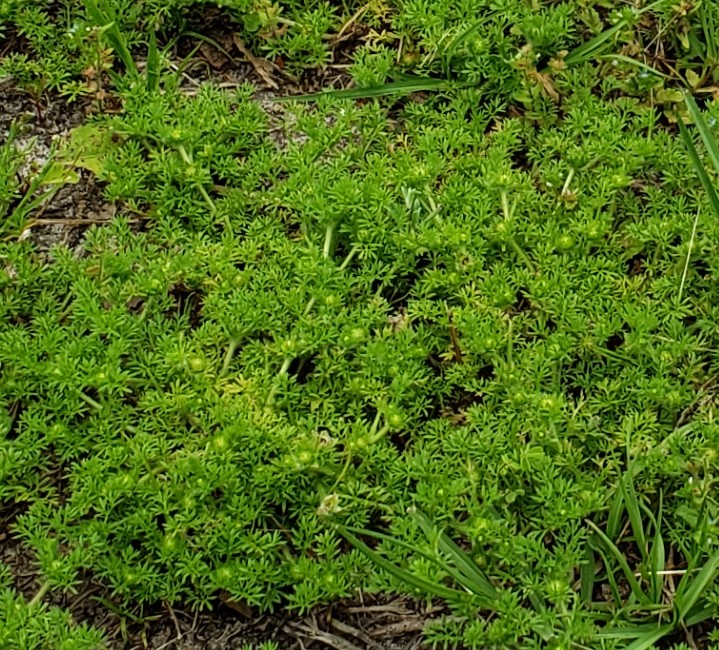
Picture taken late last summer of a Washington County field that was sprayed one time, early last summer. Note the tremendous difference between sprayed and un-sprayed areas. Based on increased forage production, this herbicide application was clearly a sound financial decision. Photo Credit: Mark Mauldin
I like to kill weeds. That said, just because weeds are present doesn’t always mean it makes financial sense to apply a herbicide – even a “cheap” one. Herbicide applications need to pay for themselves (chemical and application costs) by increasing the amount or quality of forage available for grazing or harvest. Carefully evaluate the economics of every application, and make sure your efforts will improve your operation’s bottom line.
Every year, I am amazed at the number of people that contact me wanting to control annual weeds after they’ve already set seed. As the name implies, annual plants complete their life-cycle in one year, or less. After they make seed the plant dies. Attempting to control them late in their life-cycle is pointless: the seeds are made;, and the weeds will be back next year. This is a simple concept and shouldn’t be an issue. However, when fields are not scouted properly many weeds go unnoticed until they have grown large and have produced seed. In this scenario, not only are the weeds preparing to die on their own, but because they were allowed to grow for a whole season, they have already competed with the desired forage species – the forage production is already lost. There is no way for the application to pay for itself.
Perennial weeds will impact forage quantity or quality year after year, so their control is more easily justified from an economic standpoint. However, the concept of controlling weeds early in the season applies to perennials also. Delaying control until late in the season allows:
- Increased establishment – As perennial weeds get older, they increase their energy reserves and generally become harder to control. In most situations, early season control of smaller weeds is effective even at lower end of the recommended rate range, or with less expensive herbicides. As perennial weeds get older and more difficult to control, the list of control options generally gets shorter and more expensive. Reducing herbicide cost (while maintaining efficacy) always makes economic sense.
- Reduced forage production – The longer you wait in the growing season to control weeds, the more you reduce forage production, because the weeds are competing for moisture and nutrients with the desired forages. Spray early, so increased forage production can help offset the cost of the application in the first year.
- Seed production – If weeds are controlled after seed is produced there will be a new population to deal with next year. Because of existing seed banks in the soil, timely control efforts can not guarantee there will not be weeds present the next year, but allowing seed production guarantees there will be. Timely herbicide application this year can save you the cost of another application next year.
Note: While spraying early in the season is generally the most efficient plan, it should be noted that when trying to control some established perennial weeds, such as blackberry, later season applications may be more effective. Consult product labels and your UF/IFAS County Extension Agent for specific spray timing recommendations.
Remember, killing weeds without the corresponding increase in forage production doesn’t provide return on investment. It is impossible to separate the economics of herbicide use from forage management. If your forage is not capable of responding to the reduction in weed pressure, why waste your time and money. Soil fertility and grazing management issues must also be addressed as a part of your weed management strategy. Forages that are overgrazed and/or lack sufficient fertility will most likely not produce enough additional forage, post herbicide application, to pay for the application. Furthermore, without a vigorously growing forage base, one weed population will simply be replaced by another. Bare soil in a pasture will be covered by something – desirable forage or weed.
Not to step on toes, but if you are having issues with low growing weeds like burweed or rustweed, you likely have other forage management issues to address. These weeds will not out compete a healthy bahia or bermudagrass pasture. They will however, rapidly fill in bare patches. Figure out why you have bare patches before you spend money on herbicide. While there are weeds that can truly compete with healthy pastures (ex. Dogfennel, Blackberry & Dewberry, Tropical Soda Apple), many weed populations can be effectively controlled by maintaining healthy, well managed pastures.

Burweed (Soliva sessilis) filling in areas where bahiagrass was disturbed by hurricane debris removal.
Burweed is a common sight in pastures right now but it is a winter/spring annual and has very likely already made seeds. Rather than spending money to control burweed this late in its season, focus on improving the forage stand so the next generation will have no open ground on which to grow. Photo Credit: Mark Mauldin

Burweed (Soliva sessilis) – The seeds/burs are found in the lighter colored, circular area where the stems branch. Photo Credit: Mark Mauldin
Herbicide applications that don’t work are never cost effective. Make sure you know what weed(s) you’re trying to control and what product(s) will get the job done. Be sure to use properly calibrated equipment, the appropriate rate of herbicide, get good coverage, and don’t forget the recommended adjuvants. Don’t hesitate to contact your county’s UF/IFAS Extension Office for assistance with any of these issues.
–
Final thoughts to help you maximize the economic returns of your herbicide applications:
-
It’s too late to worry about winter/spring weeds.
-
Have a plan to control summer weeds early in the season.
-
Make sure soil fertility and good grazing management are in place.
-
If you decide to spray – do it right. Get assistance if needed.
